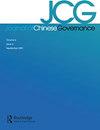The government-business relations: how Chinese business leaders take part in government policy formulation in the National People’s Congress
IF 3.7
3区 社会学
Q1 POLITICAL SCIENCE
引用次数: 3
Abstract
Abstract To better understand the government-business relations and the governance in China, this study investigates the effects of Chinese business leaders’ membership in the National People’s Congress (NPC) on government subsidy, firm’s strategic change, and labor inefficiency. Our sample consists of 959 firms with business leaders in the 10th and 11th NPC, which account for 88% of the total firms that have business leaders in the NPC. To make a valid comparison, we used various criteria to create a matching sample of 44,894 firms that have no business leaders in the NPC. The results suggest that NPC membership has a positive effect on government subsidy, and negative effects on firm’s strategic change and labor inefficiency. After conducting a post-hoc analysis, we found interesting interaction effects of NPC membership and firm ownership upon firm’s strategic change and labor inefficiency. State-owned firms had stronger negative relationships between NPC membership and strategic change, and between NPC membership and labor inefficiency.政商关系:中国商界领袖如何参与全国人大政府政策制定
摘要为了更好地理解中国政商关系和政府治理,本研究考察了中国商界领袖的全国人大代表身份对政府补贴、企业战略变革和劳动效率低下的影响。我们的样本包括959家在第十届和第十一届全国人大中有商业领袖的企业,占全国人大中有商业领袖的企业总数的88%。为了进行有效的比较,我们使用各种标准创建了44,894家在全国人大中没有商业领袖的公司的匹配样本。结果表明,人大成员资格对政府补贴有正向影响,对企业战略变革和劳动效率低下有负向影响。在进行事后分析后,我们发现全国人大成员和企业所有权对企业战略变革和劳动效率低下有有趣的交互作用。国有企业参加全国人大与企业战略变革、国有企业参加全国人大与劳动效率低下的负相关关系更强。
本文章由计算机程序翻译,如有差异,请以英文原文为准。
求助全文
约1分钟内获得全文
求助全文

 求助内容:
求助内容: 应助结果提醒方式:
应助结果提醒方式:


